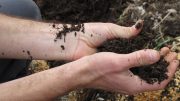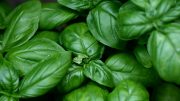Photo Credit – Fresh Mulch, Red Garden – F.D. Richards – Flickr
What is Mulch?
Mulch is a layer of material applied to the surface of soil in gardens, landscaping, and agricultural settings. It can be made from organic materials, such as wood chips, straw, grass clippings, compost, or shredded leaves, as well as inorganic materials, such as rocks, gravel, and plastic. The purpose of mulch is to protect the soil, enhance its appearance, and support plant health.
Why is Mulch Important in Gardening?
Mulch serves several critical functions in gardening:
- Moisture Retention: Mulch helps hold moisture in the soil, reducing the need for frequent watering, especially in hot and dry conditions.
- Weed Control: By creating a barrier, mulch suppresses weed growth, making it harder for weed seeds to germinate and compete with your plants for nutrients and light.
- Temperature Regulation: Mulch helps insulate the soil, keeping it cooler in the summer and warmer in the winter. This temperature regulation creates a more stable environment for plant roots.
- Soil Enrichment: Organic mulch breaks down over time, adding nutrients back into the soil and improving its structure and fertility.
- Erosion Prevention: Mulch protects the soil from erosion caused by wind and rain, helping to maintain soil health.
How to Use Mulch
- Application: Spread a layer of mulch 2-4 inches thick around plants, flowers, and vegetables. Be careful not to pile mulch against the stems or trunks, as this can cause rot.
- Location: Apply mulch in garden beds, around trees, on pathways, and in vegetable gardens to achieve optimal benefits.
When to Use Mulch
- Spring and Summer: Applying mulch in early spring helps retain moisture as plants begin to grow. It is also beneficial during the hot summer months to conserve water.
- Fall: Mulching in the fall protects plant roots from winter frost and helps maintain soil temperature
How to Make Your Own Mulch
Creating your own mulch is easy and can be done with readily available materials:
- Shredded Leaves: Collect autumn leaves, run them through a shredder, or simply mow over them to create smaller pieces. Shredded leaves make an excellent, free mulch.
- Grass Clippings: After mowing your lawn, you can use the clippings as mulch. Allow them to dry out first to prevent clumping.
- Wood Chips or Bark: If you have access to a wood chipper, you can create your own mulch from branches and tree trimmings.
- Compost: A layer of compost can serve as both mulch and a soil amendment, enriching the soil as it breaks down.
How Does Mulching Help the Organic Gardener?
Mulching is especially beneficial for organic gardeners because:
- Soil Health: Organic mulch contributes organic matter to the soil, improving soil structure, fertility, and overall health.
- Minimized Chemical Use: By suppressing weeds and retaining moisture, mulch reduces the need for chemical herbicides and excess watering.
- Biodiversity Support: Organic mulch attracts beneficial microorganisms and earthworms, which enhance soil health and plant growth.
- Sustainability: Using materials that would otherwise be discarded (like leaves or grass clippings) promotes sustainable gardening practices.





